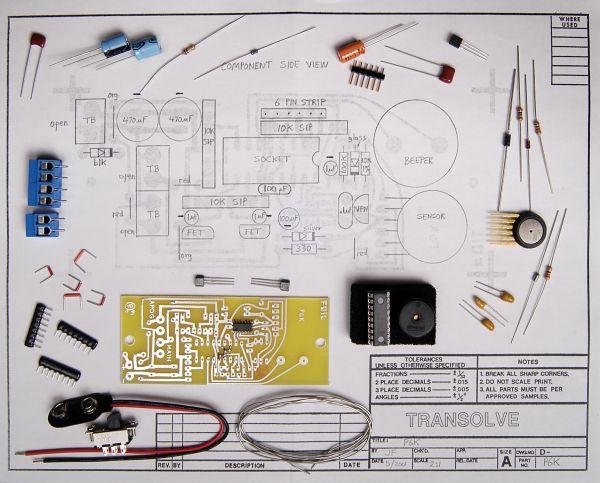Transolve P6-K Altimeter Kit
Transolve - P6-K Altimeter Kit {Component}
Contributed by Drake "Doc" Damerau
| Manufacturer: | Transolve  |
Brief:
The Transolve P6K is a peak reporting dual deployment barometric altimeter. It
is the same altimeter as their P6 model, but in kit form. It measures 1.4"
x 4" x 1.2" and weighs 1.1oz without the required 9V alkaline
battery. Just as it's sister model, it has dual deployment, with a selectable
main deployment at 400 or 800 feet or an optional chip with 600 or 1,200 feet
main deployment. The P6K has peak reporting to a range of 25,000 feet with 100
foot accuracy. The on-board beeper signals continuity, altimeter status, and
peak readout in feet. For the speed demons, it has a programmable
"Supersonic Inhibit Delay" (SID) for 5, 10, or 15 seconds that is
changeable using jumper blocks. This allows it to be used for any supersonic
flight. It's a rugged design, capable of firing any low current e-match or
flashbulb. With low power usage, it is capable of sitting on the pad for
several hours. This unit is also capable of triggering Transolve's air-start
board timer for staging, air-starting motors, or other timer dependant events.

Construction:
The kit includes the printed circuit board, a bag of components, low current
LEDs for testing, a switch, and two sets of instructions. One set of
instructions if for building the unit and the other is for its operation. It
even comes with enough solder to complete the project. Don't worry if you have
never built an electronic project. The instructions contain information for
soldering your first project. The smallest surface mounted components have
already been installed for you, so the steadiest of hands is not mandatory. It
took me less than 1/2 hour to assemble and test my unit.
The instructions take you through the building process by first explaining which components are which. It then tells you which components to solder first and which ones require special attention.
Even if you are a newcomer to soldering electronics, this kit will not be too difficult and should take you a little more than an hour to assemble. You will need to buy or borrow a soldering iron. You may also want to practice on some thin speaker wire or bell wire but you will need extra solder for this. If you make a mistake, you can send it to Transolve and they will repair it for a listed $5.00 to $10.00.
I purchased the optional air-start board with my P6K kit. I found that the instructions to wire the P6K to the air-start board were missing. I sent an email regarding the subject and I received with a very quick and friendly response. Apparently I was the first customer to buy the two units and discover the missing instructions. Transolve has since added this to the P6K instructions.
Flight:
I test flew the P6K in a scratch built rocket that has a 54mm central motor and
four 38mm outboards. I used the P6K for deployment as well as triggering the
air-start board. The altimeter is designed to trigger the air-start timer at
300 feet for safety. I used the included relay and two 9V batteries to light
all four J330 motors. All four motors lit with authority right on cue.
Summary:
With a retail cost of $58.00 including shipping, the price of the Transolve P6K
is considerably less than comparable models.
PROs: Rugged and inexpensive.
CONs: Larger and heavier than some altimeters
 |
 |
S.B. (January 4, 2008)
Sponsored Ads
 |
 |












K.A.B. (July 15, 2007)